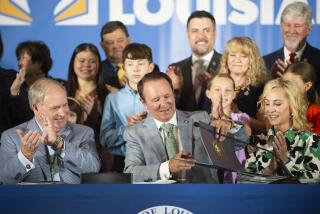Editorial: Supreme Court errs on Texas’ Confederate-themed license plates
Many Americans who find the Confederate battle flag offensive will have no problem with the Supreme Court’s ruling Thursday that Texas was free to reject a specialty license plate that incorporated that flag in its design. But the 5-4 decision was a mistake that undermines an important principle: that once the government creates a forum for private expression, it can’t pick and choose among the messages that are conveyed.
That’s what the Texas Department of Motor Vehicles Board did when it rejected a proposed specialty license plate designed by the Sons of Confederate Veterans while approving myriad specialty plates sponsored by other groups. While the veterans group regards the Confederate flag as a symbol of the bravery of their ancestors, others understandably see it as an emblem of white supremacy.
But the question for the court wasn’t which of those interpretations of the flag is correct. It was rather whether the proposed specialty plate should be considered private speech or government speech. If the message on the license plate is viewed as the speech of the individual driving the car, the government would have no right to restrict what could be said. But Justice Stephen Breyer, writing for the court, opted for the alternative interpretation, adding that when government speaks, “it is not barred by the Free Speech Clause from determining the content of what it says.”
Breyer’s general point is correct. But the Texas specialty license plate program was designed not to communicate the state government’s opinion but to encourage individuals — for a fee — to use the plates as metallic bulletin boards to propagate the message they endorse. That is comparable to opening up a public park for all comers to make political speeches.
In a devastating dissent, Justice Samuel A. Alito Jr. noted that Texas now offers 340 specialty plates promoting colleges, universities, Masonic groups, NASCAR drivers and even a burger restaurant. (Other messages are political, such as “Choose Life” and “Don’t Tread on Me.”) “As you sat there watching these plates speed by,” Alito asked, “would you really think that the sentiments reflected in these specialty plates are the views of the state of Texas and not those of the owners of the cars?”
Taken to its logical conclusion, the majority’s theory would allow a state government to authorize specialty license plates with an anti-abortion message but reject those that espoused a pro-choice view — or to approve plates that said “Vote Republican” but not “Vote Democratic.”
States are under no obligation to sublet portions of their license plates for the proclamation of a message favored by the car’s owner, whether it’s a commemoration of Confederate veterans, a pitch for recycling or an homage to the owner’s alma mater. But once they decide to get into the billboard business, they may not play favorites. That is what the court should have said.
Follow the Opinion section on Twitter @latimesopinion and Facebook
More to Read
Sign up for Essential California
The most important California stories and recommendations in your inbox every morning.
You may occasionally receive promotional content from the Los Angeles Times.










